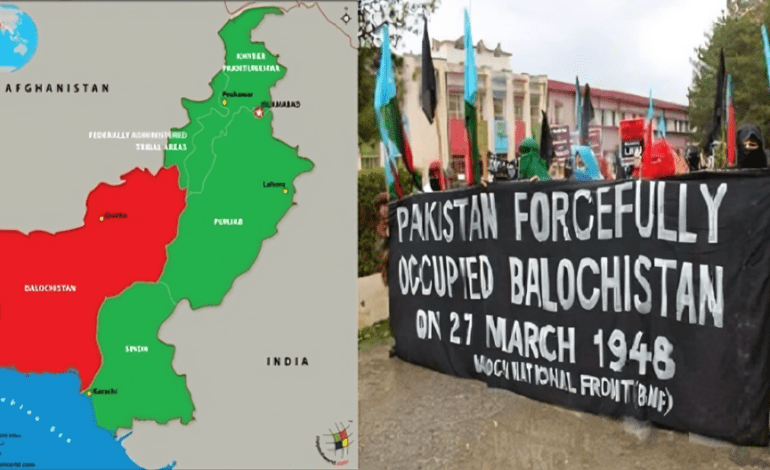
Balochistan declares independence: India watches closely as Pakistan faces internal rebellion
By Dr. Avi Verma | IndoUS Tribune
A major geopolitical shift is unfolding on Pakistan’s western border as the Balochistan Liberation Army (BLA) has declared Balochistan’s independence from Pakistan. This dramatic move follows a surge of coordinated attacks by the BLA on Pakistani security forces across the mineral-rich province, signaling a rapid erosion of Islamabad’s authority.
Although Pakistan’s government insists the insurgency remains contained, Baloch leaders are now engaging global media, asserting full sovereignty over Balochistan—a region that makes up roughly 44% of Pakistan’s landmass yet remains economically marginalized.
India’s strategic concerns
India has long raised alarm over the marginalization and human-rights abuses suffered by the Baloch people. Successive Indian governments have cited reports of enforced disappearances, extrajudicial killings, and suppression of free expression in Balochistan—symptoms of Pakistan’s internal failings rather than external interference.
In recent statements, Mir Yar Baloch, a leading figure in exile, directly appealed to India, the United Nations, and other democracies for formal recognition, humanitarian aid, and diplomatic backing to stabilize what he calls a nascent “Baloch nation.”
Historical roots of the uprising
The current rebellion is rooted in the forced 1948 annexation of the Khanate of Kalat, Balochistan’s largest princely state, which initially sought independence rather than accession to Pakistan. Since then, every generation has seen fresh crackdowns and renewed resistance.
Key grievances include:
- Resource Exploitation: Despite vast reserves of natural gas, copper, and gold, Balochistan remains Pakistan’s poorest province, with local communities receiving none of the wealth they generate.
- Military Repression: Human rights organizations—Amnesty International and Human Rights Watch—document thousands of enforced disappearances, extrajudicial killings, and civilian casualties from army operations.
- Cultural Suppression: Efforts to eradicate Baloch language and political expression have fueled a sense of collective disenfranchisement.
Pakistan’s denial vs. ground reality
While Islamabad claims stability, independent journalists and ex-military insiders report that entire army convoys and installations in Turbat, Gwadar, and Khuzdar have been besieged. Col. Qureshi, a former Pakistani officer now in exile, confirms that “the illusion of control is propagated for foreign audiences.”
Ethnic and religious composition
Balochistan’s demographic tapestry adds further complexity. The province is home to approximately 11.9 million people, of whom 55.7% are Baloch (around 6.6 million), 36% are Pashtun, and the remaining 8% comprise Hazara, Sindhi, Punjabi, Uzbek, Turkmen, Tajik, Saraiki, and other minorities.
Religiously, Sunni Islam is predominant among both Baloch and Pashtun communities. A significant Shia minority includes Twelver Shias—particularly among the Hazara in Quetta—and adherents of Zikrism, a Mahdist Shia sect native to southern Balochistan. Smaller communities of Hindus, Christians, Sikhs, and Zoroastrians also contribute to the province’s cultural mosaic but often face systemic discrimination.
India’s calculated response
India’s Ministry of External Affairs has not issued a formal stance on Balochistan’s declaration, but Delhi’s strategic community is closely monitoring the upheaval. Analysts note that while India stands to gain from a weakened Pakistan, any overt recognition of Balochistan must consider:
- International Repercussions: Potential backlash from China (protector of the CPEC corridor) and the OIC bloc.
- Moral Imperative: India has previously raised the plight of Baloch civilians at the United Nations Human Rights Council.
Possible Indian support might include:
- Humanitarian Aid for displaced Baloch families
- Covert Diplomatic Engagements with Baloch leaders abroad
- Technical Assistance to rebuild critical infrastructure if independence endures
Regional fallout
Balochistan anchors the China-Pakistan Economic Corridor (CPEC) and the Gwadar port. An independent Balochistan could jeopardize China’s multi-billion-dollar investments and its access to the Arabian Sea.
Similarly, Iran, home to its own Baloch minority, will watch nervously, fearing the spread of separatist fervor into its southeastern provinces.
The turning point
In 1971, East Pakistan became Bangladesh amid cultural and political suppression. Today, Pakistan confronts a similar reckoning in Balochistan. The question now is whether Islamabad can quell the insurgency—or if history will repeat itself, resulting in yet another territorial fracture.
IndoUS Tribune will continue to report as this situation develops and its impact on South Asia becomes clear